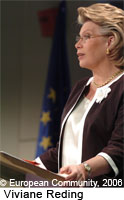Reding announces new telecoms policy
Viviane Reding, the European Commissioner for Information society and Media, has announced a public consultation on new plans for the future of the European telecoms and broadcasting industries. While the plans are designed to increase consistency and stimulate competition around Europe, Ms Reding has endured harsh criticism from the UK and from Europe's telecoms operators for her proposals. The proposals are designed to form a framework to regulate electronic communications, such as fixed and mobile phone networks, broadband, television and radio. The market is estimated to be worth more than €270 billion per year, with Europe holding some of the world's largest players. The sector is also a major player in research and technology. New developments in gadgetry and media are significant economic drivers now, but are expected to increase turnover and revenue in the coming years. The proposals include reducing the number of regulated markets from 18 to 12, which includes the opening of national and international calls markets and creating a single market for radio spectrum. Conversely, SMS or text messaging will be regulated for the first time. The proposals also aim to speed-up competition in the broadband Internet market - Ms Reding must also drive uptake of broadband internet in order to meet i2010 targets. 'Europe's telecoms rules are a true success story for competition, investment and consumer interests,' said Ms Reding. 'However we do need the courage to complete the process of market opening started in the 1990s. In today's electronic world, national borders have become superfluous to technology, economic interests and consumer behaviour. Operators, technological innovators, service suppliers and citizens all stand to gain from a single set of well-executed EU rules. Stronger cross-border competition and better access to spectrum, the raw material of the information society, are indispensable for sustaining Europe's competitive advantage in the telecoms sector,' she said. Use of the radio spectrum is estimated to account for up to two per cent of Europe's GDP, and this figure is growing. The Commissioner said: 'It is a competitive disadvantage for Europe that we do not have, as in the US, a single regime for spectrum management, but 25 different ones.' She also proposed a European Spectrum agency to manage these frequencies, which include wireless and mobile communication, broadcasting and GPS. In a mobile Europe, the expectation should be that mobile or wireless devices will work across international boundaries. The Commissioner said that regulation will be removed from six markets. 'Regulators should not intervene in markets where competition ensures low prices, high quality and innovative services for customers,' she said. The consultation will also propose removing regulation on the markets for wholesale access and origination on public mobile telephone networks and broadcasting transmission. However, the telecoms industry has reacted swiftly and angrily to the proposals, claiming that they have not gone far enough. 'As the revised directives will not enter into force before 2010, the review must be as forward looking as possible to reflect rapid changes in the market. There will be no other opportunity for changing the network before 2015. By then, the gap between Europe and its world partners will have deepened further and Europe will have missed the last call for the Lisbon Strategy,' said Michael Bartholomew, director of ETNO, the European Telecommunications Network Operators' association. ETNO says that if technological innovation increases as expected, then the merging of the broadcasting and telecommunication industries will give rise to a number of new ideas that have not even been considered yet, or new technologies that could drive down costs and access to consumers. This could have implications not only for the telecoms operators, but for broadcasters. Europe has both the world's largest broadcaster - the BBC - and the world's largest independent television producer - Endemol, but 'convergence' of telecommunications and broadcasting means that all European broadcasters are investigating new media for broadcast. ETNO says that the proposed framework may hinder development of these new areas, and so impede the development of new markets. For example, broadband may today be accessed through optical fibre, cable, WiFi, WiMax or 3G - each in theory in a different market. If, however, all those markets are deregulated, then these different platforms could compete on an equal footing - for example in terms of price or service. But Ms Reding does not believe that all these markets are sufficiently mature to allow full deregulation now. In direct opposition to the ETNO reaction, ECTA, the European Competitive Telecommunications Association, which represents the smaller telecoms players, gave broad approval to the proposals. However, ECTA does believe that the removal of regulation on some markets, such as retail, may be premature, and give the bigger players a competitive advantage. The UK has been the only Member State so far to criticise the proposals. Creative Industries Minister Shaun Woodward warned that the impact of the proposals would be to drive combined media services outside the EU, to escape regulatory pressure. 'If the Commission is wrong, the very things that are leading to this growth in creative industries, all of these people are inhibited by a whole new burst of regulation and a whole new burst of compliance,' he said. The UK approach has been to lump both broadcasters and telecoms operators together under a single light-touch regulator, OFCOM. The Commission's public consultation will end in October 2006, and legislation will then be proposed to the Council and Parliament.



